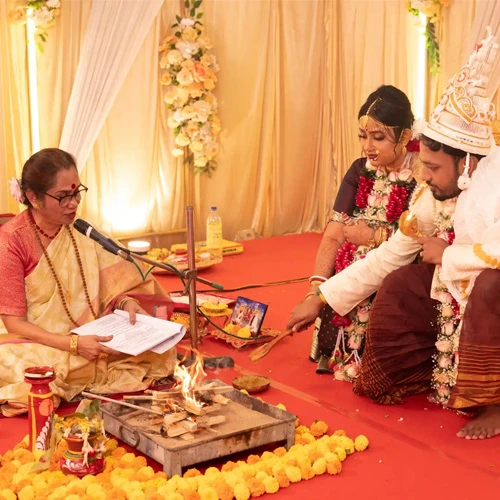
For generations, Bengali weddings have been filled with sensory poetry—red alta swirls on a bride’s feet, the heady scent of incense, the rhythm of conch shells, and mantras whispered under a mandap.
But as more couples step into marriage with eyes wide open and hearts rooted in equality, they’re quietly asking:
Can we keep the spirit of tradition while letting go of the parts that no longer feel like us?
Can we still have a Vedic marriage… without the baggage?
Today’s young Bengalis are deeply connected to their roots, but they’re also questioning inherited norms. In the middle of wedding Pinterest boards and endless Excel guest lists, many are pausing to ask:
It’s not rebellion—it’s reflection.
And this reflection is giving rise to something beautiful: a wedding service rooted in Vedic wisdom, but adapted for today's hearts and minds.
Take Taniya and Rohan, for instance. She’s an architect; he’s a documentary filmmaker. For their wedding in Kolkata, they didn’t want extravagance—they wanted meaning.
They wanted a Vedic marriage, but one where they weren’t just following steps, but understanding every one of them. One where both families felt seen, and where no one felt “given away.”
“I wanted the rituals to reflect the partnership we were stepping into,” Taniya said. “Not a transfer of ownership.”
They found their answer not in a glossy planner brochure, but in a lesser-known movement: wedding services led by lady priests.
The experience surprised even their skeptical relatives. The ceremony was in Sanskrit—but also translated into Bengali. The lady purohits explained every step, weaving in verses about respect, balance, and love.
Soft Rabindra Sangeet played between rituals—not as a gimmick, but as a natural extension of emotion. There was no Kanyadaan—but there were blessings, vows, and sacred fire bearing witness to a union built on mutual respect.
And when the couple touched their foreheads together in prayer, the moment was not performative—it was powerful.
This isn’t just a one-off story. Across Kolkata and beyond, there’s a quiet wave of couples opting for inclusive wedding services that speak to their values.
And at the heart of this wave is Sumangalam, a Kolkata-based collective of lady purohits who are gently and gracefully rewriting how Vedic marriage ceremonies are experienced.
They don’t shout. They don’t sell.
They simply offer something rare: a wedding service that is spiritual, poetic, and deeply human.
Beyond the wedding, these lady priests offer blessings for anniversaries, newborns, new homes, and even in times of loss. Whether it’s Annaprashan for a baby girl, a Grihaprabesh with Vedic chants and Brahma Sangeet, or a remembrance prayer for a loved one—the tone remains the same: dignified, warm, and rooted in compassion.
It’s not just about doing rituals.
It’s about understanding them. Feeling them. Growing with them.
If you’re a couple planning your Bengali wedding and you want it to reflect who you really are—not just who tradition expects you to be—know that you’re not alone.
You’re not rejecting culture.
You’re co-creating it.
With the right wedding service, you can still have your shubho drishti, your sacred fire, your seven steps.
But you can also have meaning, clarity, and a ceremony where every chant feels like a blessing—not a box to tick.
Sumangalam isn’t here to sell tradition. They’re here to serve it—with grace, openness, and deep reverence for both the Vedas and the modern spirit.
Learn more about Vedic Marriage services with Sumangalam
https://sumangalamkolkata.com/
© 2025 Sumangalam . All Rights Reserved | Design & Developed by DITS